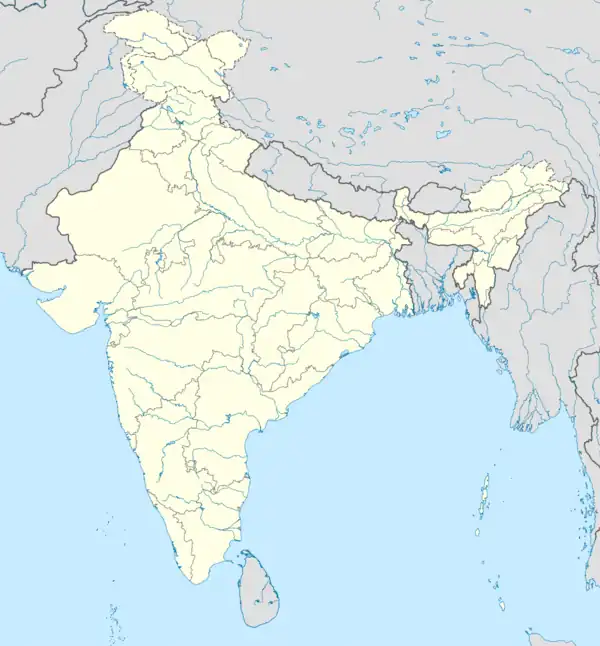Ratibati
Ratibati is a census town in the Raniganj CD block in the Asansol Sadar subdivision of the Paschim Bardhaman district in the Indian state of West Bengal.
Ratibati | |
|---|---|
Census Town | |
 Ratibati Location in West Bengal, India  Ratibati Ratibati (India) | |
| Coordinates: 23.654125°N 87.040049°E | |
| Country | |
| State | West Bengal |
| District | Paschim Bardhaman |
| Area | |
| • Total | 1.38 km2 (0.53 sq mi) |
| Population (2011) | |
| • Total | 4,508 |
| • Density | 3,300/km2 (8,500/sq mi) |
| Languages* | |
| • Official | Bengali, Hindi, English |
| Time zone | UTC+5:30 (IST) |
| PIN | 713339 |
| Telephone code | 0341 |
| Vehicle registration | WB |
| Lok Sabha constituency | Asansol |
| Vidhan Sabha constituency | Jamuria |
| Website | paschimbardhaman |
Geography
MC: Municipal Corporation, CT: census town, N: neighbourhood, R: rural centre
Owing to space constraints in the small map, the actual locations in a larger map may vary slightly
Location
Ratibati is located at 23°39′15″N 87°02′24″E.
The Asansol-Durgapur area is composed of undulating laterite soil. This area lies between the Damodar River and the Ajay River. The discovery of coal in the 18th century led to industrialisation of the area and most of the forests have been cleared.[1]
Pangachhiya, Majiara, Bhanowara, Domohani, Charanpur (OG), Ratibati and Chelad form a cluster of census towns and an outgrowth on the northern and eastern sides of Asansol.[2]
Urbanisation
According to the 2011 census, 83.33% of the population of Asansol Sadar subdivision was urban and 16.67% was rural.[3] In 2015, the municipal areas of Kulti, Raniganj and Jamuria were included within the jurisdiction of Asansol Municipal Corporation.[4] Asansol Sadar subdivision has 26 (+1 partly) Census Towns.(partly presented in the map alongside; all places marked on the map are linked in the full-screen map).
Demographics
According to the 2011 Census of India, Ratibati had a total population of 4,508 of which 2,348 (52%) were males and 2,160 (48%) were females. Population in the age range 0–6 years was 542. The total number of literate persons in Ratibati was 2,827 (71.28% of the population over 6 years).[5]
*For language details see Raniganj (community development block)#Language and religion
As of 2001 India census,[6] Ratibati had a population of 4,370. Males constitute 55% of the population and females 45%. Ratibati has an average literacy rate of 56%, lower than the national average of 59.5%: male literacy is 67%, and female literacy is 44%. In Ratibati, 13% of the population is under 6 years of age.
Infrastructure
According to the District Census Handbook 2011, Bardhaman, Ratibati covered an area of 1.38 km2. Among the civic amenities, it had 4 km roads with covered drains, the protected water supply involved service reservoir, tap water from untreated sources. It had 359 domestic electric connections. Among the medical facilities, it had was 1 dispensary/ health centre. Among the educational facilities it had was 1 primary school, 3 middle schools, 2 secondary schools and 2 senior secondary schools.[7]
Economy
Ratibati is in the heart of the coal mining zone.[8] It is under Satgram area of Eastern Coalfields Ltd., a subsidiary of Coal India Limited. The post office is located at Kalipahari, nearby.
Collieries in the Satgram Area of Eastern Coalfields are: Kalidaspur, J.K.Nagar, Satgram, Ratibati, Chapui Khas, Mithapur, Nimcha, Jemehari, Pure Searsole, Tirath, Kuardih, Ardragram OCP and Seetaldasji OCP.[9]
Education
Ratibati Hindi High School is a Hindi-medium coeducational institution established in 2003. It has facilities for teaching from class V to class X. The school has 10 computers, a library with 70 books and a playground.[10]
Healthcare
Medical facilities (hospitals and dispensaries) in the Satgram Area of ECL are available at Satgram Area Hospital (PO Devchandnagar) (with 30 beds), Satgram Project (PO Devchandnagar), Mithapur (PO Jamuria), Satgram Incline (PO Jamuria), Jamehari (PO Searsole Rajbari), JK Nagar (PO Bidhanbag), Nimcha (PO Nimcha), Amkola (PO Nimcha), Kalidaspur Project (PO Bhara Kalibari, Mejia), Jora Morh Colony (PO Bhara Kalibari, Mejia), Ratibati (PO Ratibati), Kuardih (PO Kalipahari), Chapui Khas (PO Chapui), Tirat (PO Kalipahari).[11]
See also
References
- Chattopadhyay, Akkori, Bardhaman Jelar Itihas O Lok Sanskriti (History and Folk lore of Bardhaman District.), (in Bengali), Vol I, pp 14-15, Radical Impression. ISBN 81-85459-36-3
- "Census of India 2011, West Bengal: District Census Handbook, Barddhaman" (PDF). Map of Barabani CD Block, page 167 and Map of Raniganj CD Block, page 215. Directorate of Census Operations, West Bengal. Retrieved 31 August 2018.
- "District Statistical Handbook 2014 Burdwan". Table 2.2, 2.4(a). Department of Statistics and Programme Implementation, Government of West Bengal. Retrieved 4 September 2018.
- "The Kolkata Gazette" (PDF). Notification No. 335/MA/O/C-4/1M-36/2014 dated 3 June 2015. Department of Municipal Affairs, Government of West Bengal. Retrieved 4 September 2018.
- "2011 Census – Primary Census Abstract Data Tables". West Bengal – District-wise. Registrar General and Census Commissioner, India. Retrieved 18 February 2017.
- "Census of India 2001: Data from the 2001 Census, including cities, villages and towns (Provisional)". Census Commission of India. Archived from the original on 16 June 2004. Retrieved 1 November 2008.
- "District Census Handbook Barddhaman, Census of India 2011, Series 20, Part XII A" (PDF). Section II Town Directory, Pages 1179-1210; Statement I: Status and Growth History, Page 1179; Statement II: Physical Aspects and Location of Towns, Page 1188; Statement III: Civic and other Amenities, Page 1191; Statement IV: Medical Facilities, Page 1196; Statement V: Educational, Recreational and Cultural Facilities, Page 1200; Statement VI:Industry and Banking, Page 1209. Directorate of census Operations V, West Bengal. Retrieved 14 May 2020.
- Chattopadhyay, Akkori, p 666
- "Coalmining impact on the Environment" (PDF). Chapter V: Table 5.2. shodganga.infibnet. Retrieved 21 February 2017.
- "Ratibati Hindi High School". Schools.org.in. Retrieved 20 May 2020.
- "Details of medical facilities in CIL and its subsidiaries". ECL. CIL. Retrieved 15 May 2020.
